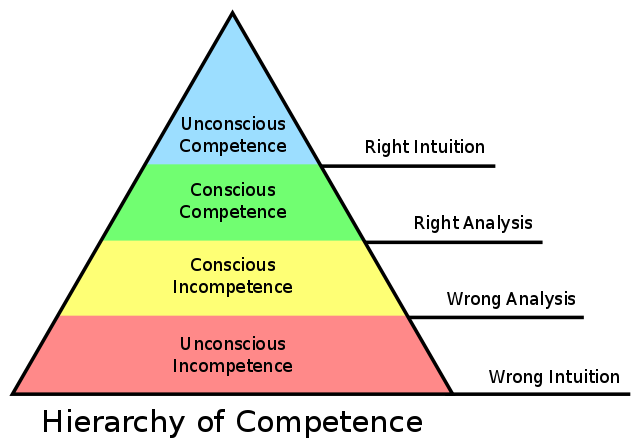Friends, Guides, Coaches, and Mentors
The "conscious competence" model for learning is fairly well known. If not explicitly, than at least implicitly. Most people can recognize when someone is operating at a level of unconscious incompetence even if they can't quite put their finger on why it is such a person makes the decisions they do. Recognizing when we ourselves are at the level of unconscious incompetence is a bit more problematic.
A robust suite of cognitive biases that normally help us navigate an increasingly complex world seem to conspire against us and keep us in the dark about our own shortcomings and weaknesses. Confirmation bias, selective perception, the observer bias, the availability heuristic, the Ostrich effect, the spotlight effect and many others all help us zero in on the shiny objects that confirm and support our existing memories and beliefs. Each of these tissue-thin cognitive biases layer up to form a dense curtain, perhaps even an impenetrable wall, between the feedback the world is sending and our ability to receive the information.
There is a direct relationship between the density of the barrier and the amount of energy needed to drive the feedback through the barrier. People who are introspective as well as receptive to external feedback generally do quite well when seeking to improve their competencies. For those with a dense barrier it may require an intense experience to deliver the message that there are things about themselves that need to change. For some a poorly received business presentation may be enough to send them on their way to finding out how to do better next time. For others it may take being passed over for a promotion. Still others may not get the message until they've been fired from their job.
However it happens, if you've received the message that there are some changes you'd like to make in your life and it's time to do the work, an important question to ask yourself is "Am I searching for something or am I lost?"
If you are searching for something, the answer may be found in a conversation over coffee with a friend or peer who has demonstrated they know what you want to know. It may be that what you're looking for - improve your presentation skills, for example - requires a deeper dive into a set of skills and it makes sense to find a guide to help you. Perhaps this involves taking a class or hiring a tutor.
If you are lost you'll want to find someone with a much deeper set of skills, experience, and wisdom. A first time promotion into a management position is a frequent event that either exposes someone's unconscious incompetence (i.e. the Peter Principle) or challenges someone to double their efforts at acquiring the skills to successfully manage people. Finding a coach or a mentor is the better approach to developing the necessary competencies for success when the stakes are higher and the consequences when failing are greater.
A couple of examples may help.
When I was first learning to program PCs I read many programming books cover to cover. It was a new world for me and I had very little sense of the terrain or what I was really interested in doing. So I studied everything. Over time I became more selective of the books I bought or read. Eventually, I stopped buying books altogether because there was often just a single chapter of interest. By the time I concluded my software development career, it had been many years since I last picked up a software development book. This was a progression from being lost at the start - when I needed coaches and mentors in the form of books and experienced software developers - to needing simple guidance from articles and peers and eventually to needing little more than a hint or two for the majority of my software development career.
A more recent example is an emergent need to learn photography - something I don't particular enjoy. Yet for pragmatic reasons, it's become worth my time to learn how to take a particular kind of photograph. I needed a coach or a mentor because this was entirely new territory for me. So I hired a professional photographer with an established reputation for taking the type of photograph I'm interesting in. My photography coach is teaching me what I need to know. (He is teaching me how to fish, in other words, rather then me paying him for a fish every time I need one.)
Unlike the experience of learning how to program - where I really didn't know what I wanted to do - my goal with photography is very specific. The difference had a significant influence on who I choose as guides and mentors. For software development, I sought out everyone and anyone who knew more than I. For photography, I sought a very specific set of skills. I didn't want to sit through hours of classes learning how to take pictures of barn owls 1,000 meters away in the dark. I didn't want to suffer through a droning lecture on the history of camera shutters. Except in a very roundabout way, none of this serves my goal for learning how to use a camera for a very specific purpose.
Depending on what type of learner you are, working with a mentor who really, really knows their craft about a specific subject you want to learn can be immensely more satisfying and enjoyable. Also, less expensive and time consuming. If it expands into something more, than great. With this approach you will have the opportunity to discover a greater interest without a lot of upfront investment in time and money.




